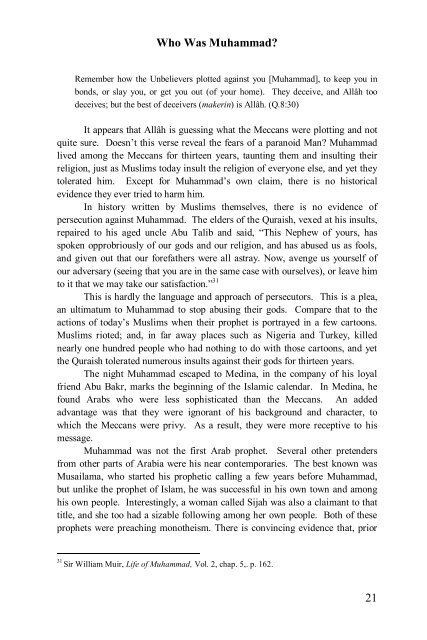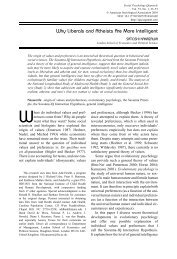Ali Sina - Understanding Muhammad
Ali Sina - Understanding Muhammad
Ali Sina - Understanding Muhammad
You also want an ePaper? Increase the reach of your titles
YUMPU automatically turns print PDFs into web optimized ePapers that Google loves.
Who Was <strong>Muhammad</strong><br />
Remember how the Unbelievers plotted against you [<strong>Muhammad</strong>], to keep you in<br />
bonds, or slay you, or get you out (of your home). They deceive, and Allâh too<br />
deceives; but the best of deceivers (makerin) is Allâh. (Q.8:30)<br />
It appears that Allâh is guessing what the Meccans were plotting and not<br />
quite sure. Doesn’t this verse reveal the fears of a paranoid Man <strong>Muhammad</strong><br />
lived among the Meccans for thirteen years, taunting them and insulting their<br />
religion, just as Muslims today insult the religion of everyone else, and yet they<br />
tolerated him. Except for <strong>Muhammad</strong>’s own claim, there is no historical<br />
evidence they ever tried to harm him.<br />
In history written by Muslims themselves, there is no evidence of<br />
persecution against <strong>Muhammad</strong>. The elders of the Quraish, vexed at his insults,<br />
repaired to his aged uncle Abu Talib and said, “This Nephew of yours, has<br />
spoken opprobriously of our gods and our religion, and has abused us as fools,<br />
and given out that our forefathers were all astray. Now, avenge us yourself of<br />
our adversary (seeing that you are in the same case with ourselves), or leave him<br />
to it that we may take our satisfaction.” 31<br />
This is hardly the language and approach of persecutors. This is a plea,<br />
an ultimatum to <strong>Muhammad</strong> to stop abusing their gods. Compare that to the<br />
actions of today’s Muslims when their prophet is portrayed in a few cartoons.<br />
Muslims rioted; and, in far away places such as Nigeria and Turkey, killed<br />
nearly one hundred people who had nothing to do with those cartoons, and yet<br />
the Quraish tolerated numerous insults against their gods for thirteen years.<br />
The night <strong>Muhammad</strong> escaped to Medina, in the company of his loyal<br />
friend Abu Bakr, marks the beginning of the Islamic calendar. In Medina, he<br />
found Arabs who were less sophisticated than the Meccans. An added<br />
advantage was that they were ignorant of his background and character, to<br />
which the Meccans were privy. As a result, they were more receptive to his<br />
message.<br />
<strong>Muhammad</strong> was not the first Arab prophet. Several other pretenders<br />
from other parts of Arabia were his near contemporaries. The best known was<br />
Musailama, who started his prophetic calling a few years before <strong>Muhammad</strong>,<br />
but unlike the prophet of Islam, he was successful in his own town and among<br />
his own people. Interestingly, a woman called Sijah was also a claimant to that<br />
title, and she too had a sizable following among her own people. Both of these<br />
prophets were preaching monotheism. There is convincing evidence that, prior<br />
31<br />
Sir William Muir, Life of <strong>Muhammad</strong>, Vol. 2, chap. 5,. p. 162.<br />
21






